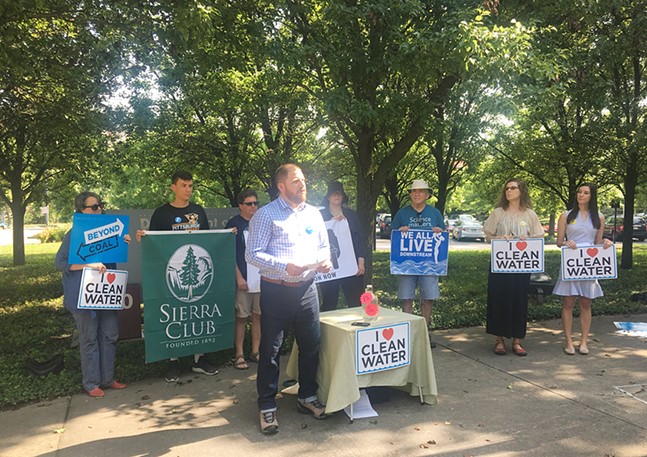Thursday, August 24, 2017
Stolz, a Democrat from Shaler, is an expert on the effects of natural-gas drilling, or fracking, in Southwestern Pennsylvania. He says he believes his environmental background is key to representing the district, and believes a focus on green energy can lead to what the 12th District needs most: jobs. (While the 12th-district unemployment rate is on par with the state average of 5.4 percent, in many towns the figure is higher, including Ambridge, at 6.4 percent, and Johnstown, at about 8 percent.)
Tags: John Stolz , Keith Rothfus , Aaron Anthoney , Tom Prigg , Elizabeth Tarasi , Donald Trump , Duquesne University , Ambridge , Beaver County , Johnstown , Pennsylvania 12th Congressional District , Bernie Sanders , Hillary Clinton , Conemaugh River , Stony Creek River , Cambria County , PolitiCrap , Image
Wednesday, August 2, 2017
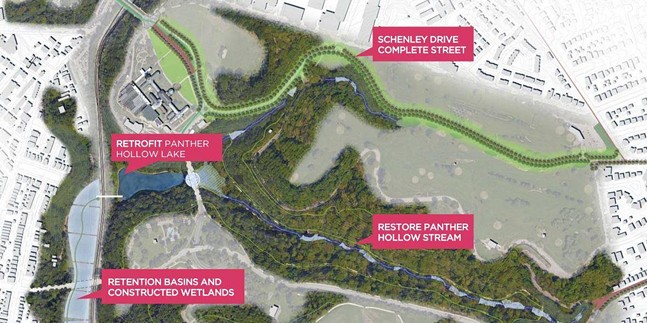
In December 2015, Pittsburgh officials attempted to convince the neighborhood to support a transit project that would have shuttled autonomous vehicles through Four Mile Run (this was part of the city’s Smart Cities transit application that the city wasn’t awarded). Most Four Mile Run residents opposed the transit project, and many argued that if the city was going to invest in the neighborhood, an infrastructure project to solve the area’s flooding issues should be first on the list.
Tags: Pittsburgh United , Pennsylvania Interfaith Impact Network , Sierra Club , Pittsburgh Parks Conservancy , Pittsburgh City Council , Greenfield , Four Mile Run , Aly Shaw , Oakland , Squirrel Hill , Image
Monday, June 19, 2017
“I’m here on behalf of our 130,000 members and supporters in Pennsylvania to demand that Governor Wolf and the Department of Environmental Protection meet their legal obligation to protect Pennsylvania residents from toxic pollution entering our streams and rivers from coal-fired power plants,” said Patrick Grenter, senior campaign representative with the Beyond Coal campaign of the Sierra Club.
Tags: Cheswick , Sierra Club , Tom Wolf , Donald Trump , Beth Shaaban , Department of Environmental Protection , Pennsylvania , coal , Patrick Grenter , pollution , Image
Friday, April 28, 2017
But on Sat., April 29, people across the country will stand up for the environment with a series of marches known as the People’s Climate March. And hundreds of Pittsburghers are doing their part too.
Tom Hoffman is a Pittsburgh resident and organizer at Pennsylvania's chapter of the Sierra Club. He says that more than 200 people on four buses will be traveling from the Pittsburgh area to march in the Climate March in Washington, D.C., on April 29.
“This is a good way to get the environmental movement back to its roots,” says Hoffman. “It was a real mass movement for while, we got away from that. … We need to stand up and [defend the environment] in a loud way.”
Hoffman isn’t sure how large the crowds will be in D.C., but he hopes they will come close to the numbers of the Women’s March on Washington. Hoffman says that Pittsburghers, especially, should feel the need to stand up for the environment, given the region's industrial history.
“Having the history of our industrial city, I understand a lot money was made,” says Hoffman. “But it also created a lot of dirty air and dirty water, and when the steel industry died, people left town. We need to ensure green solutions that are sustainable.”
And it’s not just city residents who are fired up about the People’s Climate March. Hoffman says that one of their buses is leaving from Washington, Pa., and that some former coal miners from that area are attending the march in Washington, D.C.
Pittsburgh will also hold a march, and organizers expect hundreds to attend. A press release about the Pittsburgh march says “Western Pennsylvanians are uniquely aware of the ways in which the petrochemical industry is destroying our health, stealing our land, and poisoning our water.” The release also says marchers will demand that government react by protect access to clean water, soil and air. (Pittsburgh still has some of the country’s most polluted air, as City Paper reported this month.)
Hoffman believes that the climate march can pressure climate-change deniers to change their tune.
“I know it's not impossible. [Climate-change measures] need support from the federal government,” says Hoffman. “This march should pressure them.”
The Pittsburgh March for Climate, Jobs, and Justice will be held 10 a.m. Sat., April 29. The march will start at the Cathedral of Learning, in Oakland, and end at Flagstaff Hill in Schenley Park.
Tags: People's Climate March , Pittsburgh , Washington , D.C. , Sierra Club , Image
Tuesday, March 28, 2017
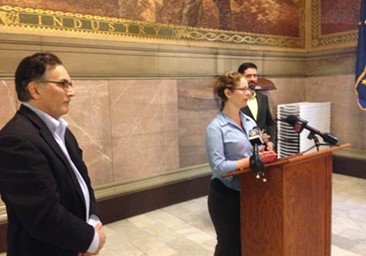
That amounts to 1.4 violations per day in the state. This number is pretty significant as is, but PennEnvironment also pointed out that only 17 percent of those violations were issued a fine. Additionally, that average fine was only $5,263.
Since many of the oil and gas companies that were administered fines, like Chesapeake Energy, pull in billions of dollars in revenue each year, Stephen Riccardi of PennEnvironment says this is akin to charging 10 cents for a parking ticket. “There would be illegally parked cars in every handicap spot and probably cars littering the sidewalk,” said Riccardi at a press conference at the Allegheny County Courthouse. “If the penalty isn’t high enough, it won’t stifle illegal polluters.”
Riccardi says these low and infrequent penalties can actually set up a toxic environment in the state. “Sadly, the message is clear: It pays to pollute if you are fracking in Pennsylvania,” said Riccardi. “These violations pose serious environmental and public-health threats.”
Raina Rippel, of the nonprofit Southwest Pennsylvania Environmental Health Project, said doctors and health experts are just beginning to understand the health impacts fracking has on populations close to fracking well pads.
“Proximity to well pads has been associated with increases in a person’s risk for respiratory and neurological problems, as well as elevated risks of birth defects,” said Rippel.
The Pennsylvania Medical Society, a health-advocacy coalition, has recently called for a moratorium on fracking.
One example of a direct link between fracking and health issues is contaminated water. Riccardi cites Texas-based Range Resources which leaked pollutants into Brush Run in Washington County last year. He adds that Pennsylvania has identified 283 instances where drinking water has been contaminated due to fracking.
John Stolz, director of Duquesne University’s Center for Environmental Research and Education, said there have been 9,400 complaints filed with the Pennsylvania Department of Environmental Protection since 2004, and more than 4,000 have been related to water contamination, according to a report from Public Herald, a nonprofit investigative journalism organization out of Coudersport, Pa.
“There is something going on, and we need the DEP to step up and hold the industry responsible,” said Stolz. “We need the industry to admit that there are some [environmental] challenges to fracking.”
Riccardi said PennEnvironment is calling for the state to restore adequate funding levels to the DEP, which has seen cuts for many years. (In 2008, the DEP budget was $229 million; in 2016, it was $148 million.) He said this can create more positions which can enforce environmental laws more frequently. Riccardi also said fines need to be increased for repeat violators.
For those looking to see increasing in fracking, this report comes at an inopportune time. Recently released census figures for 2016 show the Pittsburgh region losing thousands of residents for the third straight year. Some believe if the fracking industry were to return to levels it saw in the early part of the decade, it could help build the population back up.
Riccardi said that in the long term, fracking isn’t a good idea for the region.
“We don’t see fracking as a long-term sustainable investment in communities in Pennsylvania,” said Riccardi. “Really, we see it as an existential threat to the health of Pennsylvanians and to the safety of our environment.”
Tags: PennEnvironment , Pennsylvania Department of Environmental Protection , Image
Thursday, September 29, 2016
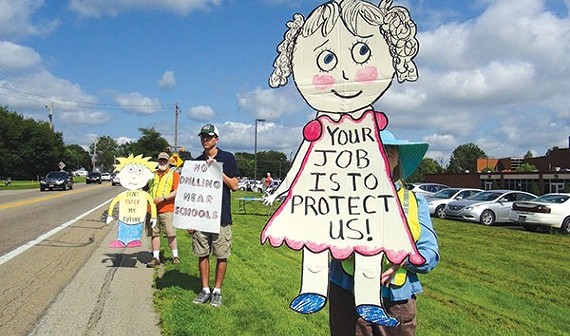
On Sept. 28, in the state Supreme Court case of Robinson Township v. Commonwealth, judges struck down many provisions of Pennsylvania’s oil and gas law, Act 13. The law passed in 2012, during Gov. Tom Corbett’s administration, and established regulations and zoning rules on natural-gas drilling. But some rules drew ire from environmentalists, and the recent state Supreme Court ruling addresses some of them.
Drillers are no longer permitted to use eminent domain to seize private, subsurface land for storage of natural gas; private wells must now disclose hazardous spills; and doctors are now allowed to inform patients of side effects associated with fracking sites, overturning the "doctor gag order."
“The Supreme Court’s ruling will restore to all Pennsylvanians the power to regulate natural gas fracking in their own communities as they see fit,” wrote state Sen. Daylin Leach (D-Montgomery County) in a press release. “It lifts the senseless and unconstitutional restriction on physicians that barred them from discussing how proprietary fracking chemicals may be affecting patients’ health.”
Before the court decision, frackers didn’t have to disclose all the chemicals they used in their drilling process (chemicals that could make their way into groundwater). Doctors could gain access to a list of the chemicals only if they signed a confidentiality agreement preventing them from telling their patients. Fracking companies claimed that revealing all the chemicals would tip off competitors to their methods.
This led politicians including Leach to promote bills that would force frackers to publicly disclose all their chemicals. But those efforts were held up in committee, and never saw votes. State Rep. Dan Frankel (D-Squirrel Hill) was among those who attempted to pass such legislation. He praised the court’s ruling in a statement made on Sept. 28.
"The Pennsylvania Supreme Court has protected patients and doctors by striking down the gag rule in Act 13,” wrote Frankel. "Patients trust that their doctor is telling them the truth, the whole truth, and that their health is the doctor’s primary concern. We should protect that trust.”
The fracking industry was not as thrilled with the decision.
“We’re disappointed in aspects of the court’s ruling,” wrote David Spigelmyer, president of the Marcellus Shale Coalition, in a Sept. 28 statement. “[It] will make investing and growing jobs in the Commonwealth more — not less — difficult without realizing any environmental or public safety benefits.”
Tags: fracking , natural gas , Act 13 , Dan Frankel , Daylin Leach , Marcellus Shale Coalition , Pennsylvania Supreme Court , Image
Thursday, September 8, 2016
And on Sept 8, Pittsburgh added two taco trucks to the corner of Forbes Avenue and Halket Street in Oakland in further defiance. The event was hosted by environmental PAC NextGen Climate PA and Braddock Mayor John Fetterman, and was set up to encourage voter registration and inform potential voters on climate-change issues.
"We think of what the future can hold," said NextGen PA spokesperson Aleigha Cavalier. "A future where there is a taco truck on every corner and a future that is conscious of climate change."
The popular Mexican fare was served by Jackie Page Tastes and Vagabond Taco Truck, and dozens of students and construction workers chowed down on the offerings. Passersby were given a free taco if they signed up to commit to vote on climate-change action, and also were encouraged, but not forced, to register to vote.
Fetterman enjoyed a taco as well and spoke to many in attendance. The Pittsburgh Taco Truck served tacos at his campaign-launch event for U.S. Senate last fall and today he said that tacos are a great unifier. (Ironically, the day before the now-infamous taco-truck quote, the Trump campaign unveiled a new "Make Mexico Great Again Also" campaign hat.)
"I don't know anybody in their right mind who doesn't love tacos. Everybody loves tacos," said Fetterman at the event. "Donald Trump is the best surrogate a Democrat ever had. [The comment] really was a gift for Democrats."
Fetterman, who has been campaigning for Democratic presidential nominee Hillary Clinton and former opponent and U.S. Senate candidate Katie McGinty, emphasized that outlandish comments like the "taco truck" one show him that the decision this November should be for the Dems.
"There really isn't a choice, if one of the choices is Donald Trump," said Fetterman.
Tags: John Fetterman , NextGen PA , Pittsburgh , Oakland , Donald Trump , Vagabond Taco Truck , Jackie Page Tastes , PolitiCrap , Image
Thursday, August 18, 2016
At the cross section of alternative mobility and urban greenspaces comes an event that’s gathering serious and casual cyclists for a trip to one of Pittsburgh’s community-created greenspaces.
GTECH, a nonprofit that focuses on greenspace initiatives, is organizing its fifth annual neighborhood biking event, Two Wheels Lots of Green. This guided biking event takes riders on tours of Pittsburgh neighborhoods, stopping at local greenspaces along the way. This year’s Two Wheels Lots of Green tour will be in Pittsburgh's southern Hill Top neighborhoods.
“Our greenspaces are really unique,” says GTECH relationship manager Katherine Chamberlain. “They take many different shapes, and they’ve all been designed by neighborhood residents.”
The event gives participants the choice to take a rigorous, hilly seven-mile ride or a leisurely four-mile ride, both through the Hill Top's Allentown and Beltzhoover neighborhoods. While stopped at greenspaces, riders will meet neighborhood residents who have dedicated time to creating a green space. The event is also attempting to raise awareness about the amount of underutilized or vacant land in Pittsburgh.
“We want the ride to be accessible to people who are familiar with biking in the city,” says Chamberlain.
“It’s also a great way for residents of the neighborhood to show ownership of their green space,”
says CEO and co-founder of GTECH, Andrew Butcher. “It can be difficult to find time to be exposed to all the amazing things that are happening in these neighborhoods.”
The idea for Two Wheels Lots of Green came from the Social Capital Council, GTECH’s social outreach committee. One committee member, who happened to be an avid cyclist, wanted to create more interest in greenspaces.
“We said, ‘Boy, I really wish there was a way that I could experience these spaces and meet the people who made them,’” says Chamberlain.
Two Wheels Lots of Green started at a time when the German Marshall Fund, a grant-making organization, was seeking initiatives that dealt with alternative mobility (like biking) and urban green space. The event received the fund's support in 2012 and has occurred yearly since. The ride aligns with GTECH’s mission to make use of vacant and underutilized land in the city.
“It was a perfect time for us,” says Butcher. “‘Shine the light and share the love’ has become a sentiment for Two Wheels Lots of Green.”
Butcher said that crowds for Two Wheels Lots of Green have grown over the past several years; composed of a mix of serious bicyclists and people simply serious about greenspace.
“We’re very excited about aligning this event with Bike Fest,” says Butcher. “This is one of my favorite GTECH events.”
“We always enjoy seeing the connection between the riders,” says Chamberlain. "There’s a developed camaraderie in the groups through a shared interest in greenspaces.”
Two Wheels Lots of Green’s rides start and end at Garden on Gearing, running from 9 a.m. to noon on Saturday. The bike tours are followed by a garden party back at Gearing, with live music, food and a pop-up playground provided by City of Play.
Participants can partake in “bike-powered” smoothies from Green Mountain Energy and iced coffee from Black Forge Coffee during the bike tours.
Tickets for Two Wheels Lots of Green are available for purchase on GTECH’s website.
Tags: GTECH , Two Wheels Lots of Green , urban greenspace , Andrew Butcher , German Marshall Fund , Katherine Chamberlain , Pittsburgh , Allentown , Beltzhoover , Image
Thursday, August 4, 2016
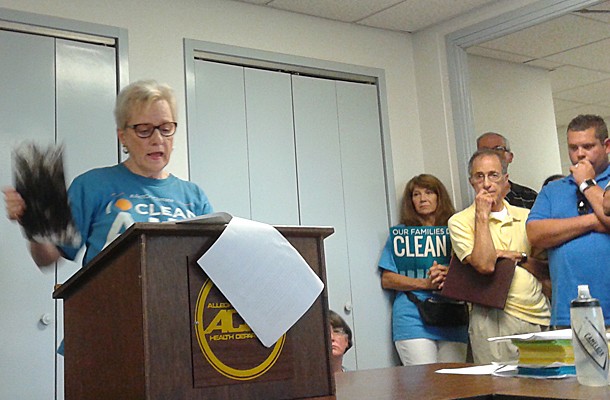
On Monday night, about 100 people crammed into a small, stuffy room at the Allegheny County Health Department's air-quality offices, in Lawrenceville, to testify on a proposed permit for the Cheswick coal-fired power plant, which sits along the Allegheny River in Springdale.
Plant employees and union members pleaded with the health department to recognize that the permit would hurt the power plant economically, while residents living near or upwind of the facility urged the department to recognize pollution's cost on human health.
"We do not oppose reasonable regulations," said Kenn Bradley, a worker with the International Brotherhood of Electrical Workers Local 29, in his public testimony. "We all want clean air, but the plant workers are very concerned that the proposed Title V permit from the county would increase operating costs and ... puts the Cheswick power station at an economic disadvantage with respect to taxpayer-subsidized renewables and other power plants outside of the county."
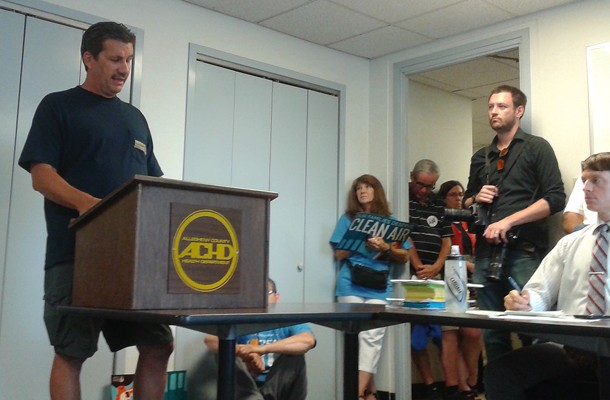
The proposed permit tightens the amount of sulfur dioxide (SO2), nitrogen oxide (NOX), particulate matter smaller than 2.5 microns (PM2.5) and sulfuric-acid mist that the plant's owner, GenOn, can emit. Comparing the plant’s former permit to the new draft, health-department deputy director Jim Thompson says the amount of allowable SO2 would decrease by 59 percent; allowable NOX by 48 percent; PM2.5 by 25 percent; and sulfuric-acid mist by 80 percent. The permit would also require the plant to run its pollution-reducing equipment most of the time.
The plant has not been running at full capacity, and its emissions levels have been below its current allowable limits. But Thompson says that if the plant ran at the same rate as it did in 2014, NOX emissions should be reduced by about 70 percent.
According to the U.S. Environmental Protection Agency, SO2, sulfuric-acid mist and NOX released into the atmosphere cause acid rain and form ozone (which forms smog). Exposure to SO2 can also affect the respiratory system, causing asthmatic symptoms. Also, the EPA says, “numerous scientific studies connect particle pollution exposure to a variety of health issues” including reduced lung function, asthma attacks, heart attacks and premature death in those with lung or heart disease. These pollutants can travel in the wind for long distances, affecting surrounding areas, even in other states.
That's why several residents testified in support of the new permit.
"How many of us need clean air to breathe, to live? We have a responsibility. We are showing our responsibility and saying, 'Please do your best for us,'" Dianne Peterson, who lives roughly ten miles from the plant, said to health-department staff present at the hearing. "Because when you get sick, what wouldn’t you do to get your health back? It’s your kid, your body, your spouse, your asthma, your cancer. It’s all of our responsibilities, and we’re handing it to you and saying, ‘Please take it to the most stringent level you can to protect all of us.’”
A resident who lives across the street from the plant, Marti Blake, waved around photographs of black dust that builds up on her patio. "I'm consistently cleaning coal particles."
While several comments took an emotional tone about the economy and health, local air-quality watchdog Group Against Smog and Pollution, which has previously worked on regulations for Cheswick, read a statement — and submitted written comments — regarding whether the health department is consistently following the EPA's SO2-measurement rules.
"The Rule expressly requires that 'the air agency [emphasis in original] shall conduct the modeling analysis' if it chooses to use air dispersion modeling to characterize peak 1-hour concentrations of SO2 in areas effected by emissions from a source that is subject to the Rule," GASP executive director Rachel Filippini read from her written statement. (CP obtained a copy after the hearing.) "Section V.A.1.u [of the permit] would violate the Rule by allowing the Plant’s operator to conduct the air dispersion modeling. To comply ... ACHD, the air agency with jurisdiction over the Plant, must be the one to conduct air dispersion modeling pursuant to the Rule."
In its written statement, emailed to CP after the hearing, power company NRG — which recently acquired GenOn — contends that its already doing environmentally responsible work because it installed pollution-reducing equipment.
"GenOn, now a subsidiary of NRG, has spent more than $400 million on emissions control equipment at the Cheswick plant since 2003, and has dramatically improved the plant’s environmental footprint," said a written statement emailed by David Gaier, NRG spokesperson. "The plant is, and has been in compliance with all applicable environmental laws and regulations including all statewide standards established by PA DEP. We look forward to continue working with the ACHD to arrive at a permit that is fair, environmentally responsible, and keeps the station on an equal footing with other generators across the state."
According to the health department's press officer, Melissa Wade, the public record of the hearing will be available on the department's website within a few days.
Tags: Cheswick Generating Station , Allegheny County Health Department , Image
Friday, June 24, 2016
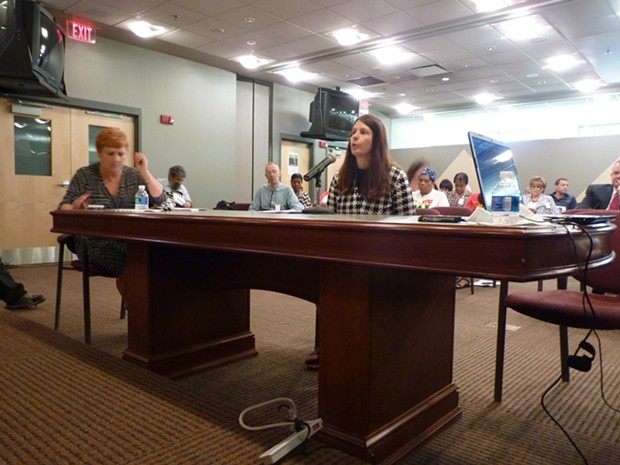
According to a 2016 report from the American Lung Association, the Pittsburgh region failed its criteria for healthy levels of ozone and particle pollution. The region improved on its air quality report from last year, but still has a way to go.
"While air quality in Pittsburgh has improved over the last several decades," says Rachel Filippini, of Group Against Smog and Pollution, or GASP. "We continue to have some of the worst air pollution in the country, especially in terms of fine-particulate matter. One source of these emissions is Port Authority buses."
It is for this reason that a group of environmental and transit advocates spoke at June's Port Authority of Allegheny County board meeting and are calling for the authority to “green their fleet” by 2030, specifically an all-electric fleet.
There are currently 426 diesel vehicles built after 2007, which some would consider “clean diesel,” and 310 diesel vehicles built before 2006, which are not considered clean. PAT board passed a resolution at the meeting that would replace 70 of the older vehicles with newer “clean diesel” options, making the fleet around 70 percent “clean diesel.”
While advocates applaud this effort, they are asking PAT to go even further. Filippini says she would like to see all pre-2006 buses eventually taken out of service and is asking the authority to transition to a fleet of electric buses that are fueled by renewable energy sources. “We must work to green the fleet.”
Kimmy Dihn, of transit-advocate group Pittsburghers for Public Transportation, says moving toward more environmentally friendly vehicles could help address public-health issues, too. “We are voicing the concern of how buses affect the public health of pedestrians, cyclists and public-transportation riders.”
She too is asking PAT to transition to an all-electric fleet. Warwick Powell, of environmental group 350 Pittsburgh, says greening the bus fleet could make Pittsburgh a climate-change leader. He also says this is a great time to do so, given all the local support, including the arrival of solar-energy giant, SolarCity, to the Pittsburgh market.
“Renewable energy has never had stronger support from the government and the public,” says Powell.
PAT spokesperson Jim Ritchie says including electric vehicles is “something we are interested in.” He says the authority is currently working on specifications that will consider including electric buses in the next contract of bus replacements, which could be presented this fall. Ritchie adds that PAT has already tested electric vehicles from companies like California-based Proterra and Canadian-based New Flyer, and plans to test electric buses from one more company. He also notes that the PAT fleet does include 32 hybrid vehicles.
Tags: Port Authority of Allegheny County , climate change , renewable energy , electric bus , air pollution , clean diesel , Pittsburghers for Public Transportation , 350 Pittsburgh , Group Against Smog and Pollution , Image



